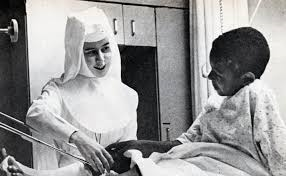
Speaking of dignity, I notice that this word is used a lot these days. Many formerly Catholic hospitals, for example, have been bought out by the secular health corporation “Dignity Health Care.” Many of the family-based funeral homes I’ve worked with over the years have been bought out by what is now the largest mortuary corporation in America, “Dignity Memorial.” And of course for years pro-suicide advocates have described their business as “death with dignity.” Why must these corporations and lobby groups assure us that we have “dignity”?
Call me suspicious, but I think a publicized insistence on human dignity follows the decline of religious faith in God, the source of all real human dignity. A healthcare network or funeral home cannot give us dignity; only God can bestow dignity to the human person.
When hospitals were staffed by Catholic nuns, we knew that our human dignity would be respected. The nuns revered their patients as images of God—they loved their patients. It seems to me that as healthcare became less of a vocation and more of a business, our dignity became less assured. Insurance companies, not religious sisters or personal doctors, now decide what level of care (“dignity”) we will receive. It seems that these corporations must now assure us of our personal dignity, but despite the PR, many feel less respected in these secular healthcare systems than when we were cared for by consecrated sisters.
Funeral homes, as well, used to be run as family operations until a few years ago. The family members who ran these homes knew their local community and loved the people they buried. They were not ashamed to speak of God and say “God bless you” or “you are in my prayers” to us. One knew that one’s body would be accorded its inherent dignity because funeral homes were “chapels,” places of prayer. But as corporations began to buy out the family funeral homes, we had to be told that we would be treated with dignity. And of course, the “death with dignity” crusade had to proclaim forcefully that dying by one’s own hand was fully in accord with human dignity.
But those who package and sell the word “dignity” are not entirely convincing. Those who know they are made in God’s image do not have to be told that they have dignity. “I am fearfully, wonderfully made!” writes the Psalmist. No amount of advertising can convince me of that, if I don’t already have faith in a Creator God who is also my loving Father. Yes, we have dignity, not because we buy it from a corporation, but because there is a God, and he loves the creature He has made.



 RSS Feed
RSS Feed